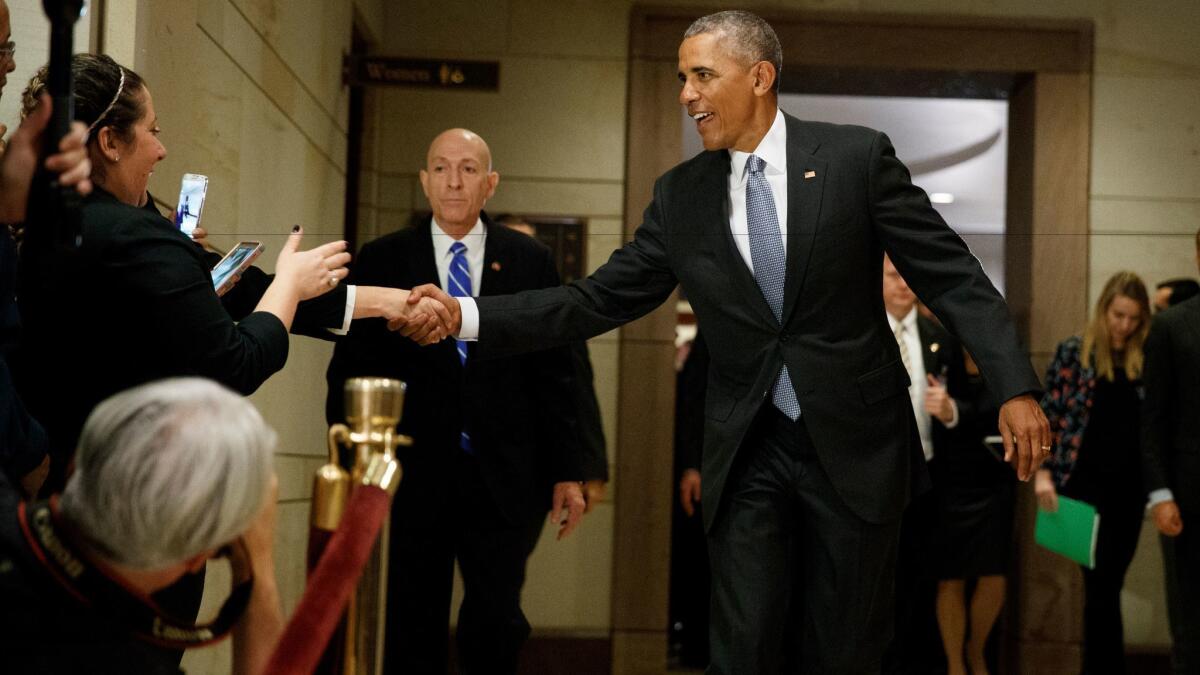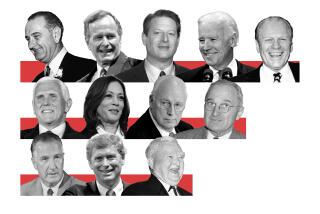Op-Ed: Obama focused on healthcare over jobs at great cost. Will Trump do the same?

- Share via
Early in his presidency, Barack Obama invested his political capital in a push to reform the health insurance system. Universal coverage was a long-held liberal priority. It was not, however, the priority of most Americans during the Great Recession.
Although Obama succeeded in passing the Affordable Care Act, he paid an immense political price. His choice to focus on healthcare — and therefore sideline economic initiatives — led to his party’s historic losses in Congress and undercut Democrats’ appeal to many working-class voters who went on to support Donald Trump.
Now President Trump is committing a similar mistake.
“The first order of business is to repeal and replace Obamacare,” as Vice President Mike Pence put it. Trump issued a directive on his first day that effectively hit the pause button on enforcing the law. Meanwhile, amid debates on half a dozen issues including refugee policy and the Supreme Court, congressional Republicans continue to grind away at their priority: the end of Obamacare.
As presidents often learn too late, political capital is a finite resource.
Yet healthcare re-reform, as well as other hyper-partisan battles, is not what Americans want most. Reminiscent of 2009, the public is foremost worried about jobs.
A Wall Street Journal/NBC News poll recently asked Americans what should be “an absolute priority” for the Trump administration and Congress. Three-fourths of adults cited retaining U.S. jobs. About two-thirds said they should reduce the influence of “big money” in politics and fund infrastructure projects. Among the 16 issues on the list, Obamacare ranked tenth, below issues such as climate change.
Predictably, Trump voters and Republicans placed Obamacare closer to the top of their lists. But fewer than half of independents told pollsters that the GOP should prioritize changing the healthcare law. (It’s worth recalling that when healthcare consumed Washington in the summer of 2009, Obama lost the majority of independents and, with them, his legislative momentum.)
Today, repealing Obamacare may be true to the GOP brand, but it’s not central to Trump’s brand. Nearly all Trump voters in the poll (94%) said that their “absolute priority” was U.S. jobs. Among working-class whites, whose support was central to Trump’s victory, Obamacare ranked ninth on their list of priorities. Number one? Jobs, again, by far.
The president’s decision to place Obamacare at the fore of his legislative ambitions might, then, not only estrange those voters who could lose their health insurance — and many of those voters are Trump voters — but also distance him from his base and undermine his larger agenda.
As presidents often learn too late, political capital is a finite resource.
Like Obama, President Clinton originally intended to “focus like a laser beam on this economy.” But other issues distracted him, including healthcare reform. With Hillary Clinton spearheading the effort, the couple overestimated their mandate and underestimated the strength of an opposition fueled by special interests, public skepticism of government solutions, and conventional partisanship.
Trump’s obstacles are more formidable. Clinton tried to expand coverage and Obama succeeded in the same; Republicans are considering repealing coverage for 20 million Americans without a surefire replacement. Withdrawing benefits, once voters feel entitled to them, is perilous politics. This is to say nothing of unintended consequences, which always bedevil major legislation.
Besides, Trump lacks the political firepower of his predecessors. His approval rating lingers at 45% according to Gallup — the lowest level for any new president since at least Harry Truman, when tracking first began. And it will be particularly difficult for Trump to “replace” the healthcare law with such modest support. Significant alternatives will require some Democrats to side against Obama’s signature achievement.
By comparison, legislation focused on adding jobs is popular on all sides.
Trump isn’t ignoring pocketbook politics; he withdrew the United States from a major trade deal. But the more fights he picks now, the more difficult he’ll find it later to wrest significant reform from Congress and make good on his inaugural promise to “bring back our jobs.”
As George Stephanopoulos once confessed to a reporter, looking back at his time advising Bill Clinton, “We picked a lot of the wrong battles early on.”
We’ll see if Trump does as well.
David Paul Kuhn is a political analyst and author of the political novel “What Makes It Worthy.”
Follow the Opinion section on Twitter @latimesopinion and Facebook
MORE FROM OPINION
The best way forward for Democrats: Target well-educated voters
Giving sanctuary to undocumented immigrants doesn’t threaten public safety—it increases it
Trump is destabilizing Europe from within and without
More to Read
A cure for the common opinion
Get thought-provoking perspectives with our weekly newsletter.
You may occasionally receive promotional content from the Los Angeles Times.









